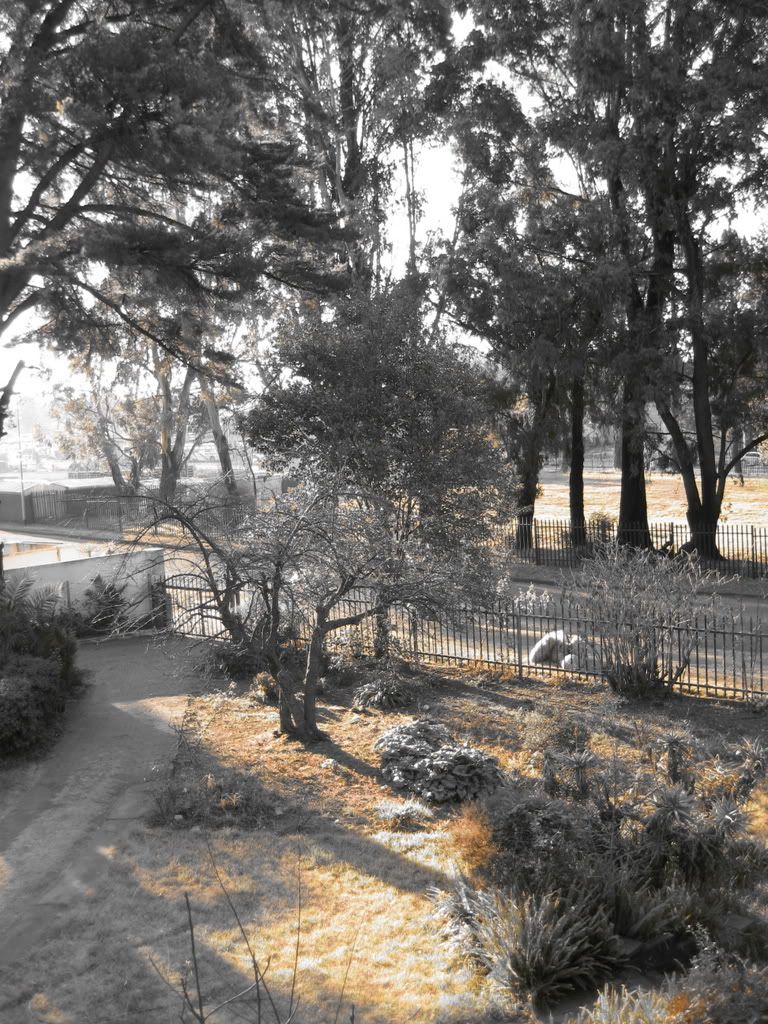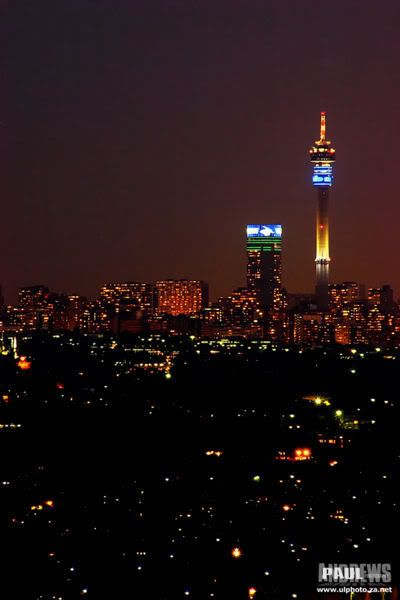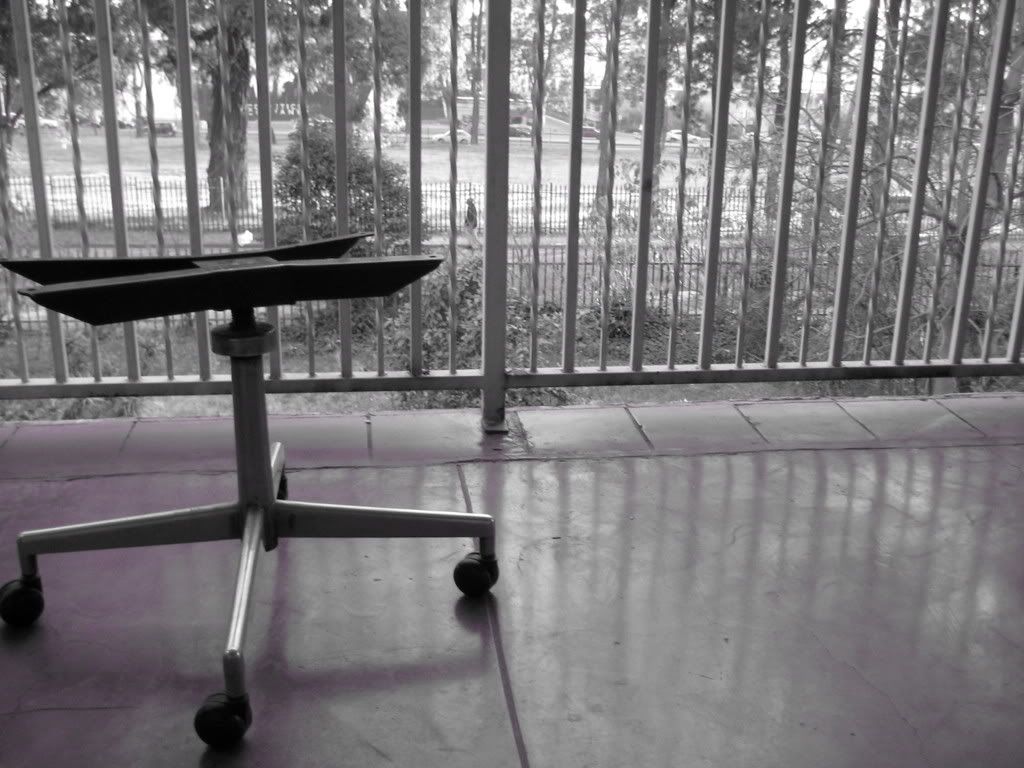My ears accept a barrage of noises from a city that seems to be in it’s adolescence.
 This city, this Joburg, is growing at an incredible clip.
This city, this Joburg, is growing at an incredible clip. A jackhammer pounds away - at what, I do not know. It is joined by other construction noises coming from the lot across the street, where a narrow strip of African savannah is soon to be replaced by multistory condos, complete with covered parking and an electrified security fence around the perimeter.
The sound of motor cars, squealing breaks, hooting horns, and rumbling diesel engines, never ceases. The South African taxi, the informal instrument of mass transit, spends it’s day hooting away at those walking beside the street. The driver is desperate to fill one of his 16 seats with a customer going his way. If he can attract one, he will earn less than a dollar for the trip, which can be many miles long.
A siren can be heard in the distance. It draws closer. Louder. I watch the BMW hatchback with lights flashing fly by, certainly on it’s way to something gruesome or terrible or, for Joburg, very common. Sirens are not infrequent. There are two sets of police, the fire department, and countless “private security” firms that all race around in response to the astronomical crime rate.
Somewhere in all of the angry noise of the urban landscape, wild Africa still penetrates. A large, gray, sickle-beaked bird (which Willie almost surely incorrectly calls a “doo-da”) sqwuaks and pecks around the grounds here. I assume that it eats worms or bugs or something down in the dirt, as it spends it’s day making an incredible noise and poking it’s perfectly curved beak into the ground. Other, more delicate, birds join the symphony. A bright yellow-bird flutters around chirping innocently. Other colorful birds, some of which look like they must have escaped from a pet store (only they are normal in Africa) play and dance away the day. It has been unseasonably warm lately, lulling the wildlife into thinking that winter is ending and spring is near. I also hear what I think is a frog, although it could be crickets or some other unknown species. It is rhythmic and soothing, nonetheless.

My surreal retreat into the jungle is cut short by a dump truck backing up. It’s song is also rhythmic, although nowhere near as soothing. It is joined by a city bus, gray and double-decked with bold, blue “METROBUS” scrawled along the side, pulling up and stopping in front of the house with the familiar “whoosh” of it’s air-brakes. It is then passed by a yellow Ferrari, roaring down the street. The amount of wealth in this country is stunning. A few days ago, there was a parade of Ferraris through Soweto, one of the most infamous shantytowns in the world. Yesterday, the police responded to a protest in that same Soweto by firing tear gas and rubber bullets at a large gathering of residents who were demonstrating for access to electricity and running water. The wealth chasm here is so wide, so obvious.
A shot rings out. It is closely followed by another . And another. A flock of “doo-da”s scatter and fuss into the air, seemingly displeased by the disturbance. We will assume that in a few minutes a siren will follow the blasts and someone will be rushed to the hospital. The gunshot is easily distinguished form the backfiring car or snap of construction equipment. It rings a little longer. It pops with a different density, a deeper resonance. It, like all of the other noises, has it’s place in Joburg.
The winter, while atypically warm, has been typically dry. This dryness (we haven’t seen as much as a cloud in two weeks) leads to dusty, dirty air. Winds bring sand from the Kalahari Desert and the abundance of diesel fumes hang in the air like a thick brown blanket. Sunrise best showcases the unnatural pollutants in the air. Beams of sunlight are trapped by brown haze, and a foggy mess hangs in between the great hills of the city. The skyline rises up out of the ashes, seemingly growing taller in order to reach the fresh air above.
The air flows in through my nose, irritating every bronchiole. The altitude (6000 feet above sea level) can steal one’s breath quickly. The pollution simply complicates the issue. Stef and I both have shallow coughs at the moment, our bodies reacting to the uninvited particulates that invade our every inhalation.
Also into the nose comes the smell of urban Africa. As it is winter, the scent of burning rubbish hangs loosely in the air. Every evening, the homeless and the unfortunate millions with tin shacks to sleep in gather around fire, for light and heat. Today, the smell of the nearby squatter camps is faint, barely noticeable. Maybe the wind has changed direction. The smell of all sorts of trees is strong as well and even the red dust that clouds the air has an odor. It is difficult to describe, but it seems to have been cross-pollinated with the diesel fumes. It can almost be tasted.
Every so often, one can smell a cheeseburger on the wind. This is not the fantasy of a homesick American. It is, rather, globalization at work. Within a stones throw of the Mission House is McDonalds. And the Big Mac tastes exactly the same. As if that weren’t enough, KFC lies across the street from there, frying up finger-licking good chicken just like the Colonel would have made it.
I would be able to see both restaurants from my vantage point on the balcony if not for Campus Square, a relatively new, relatively nice shopping center across the way. It features about 30 shops (banks, restaurants, a grocery store, and drug store) and it is emblazoned with advertisements on it’s otherwise blank back wall. I am confronted by a two-story, black-and-white Virgin Cosmetics advert. In Africa, there are very few places where an ad is not placed. It makes American streets looked positively uncluttered. The days’ news is hung on placards on every streetlight pole available. Every bus and taxi seems to have some place to sell me soap or concert tickets or corn meal. Buildings downtown are ablaze at night, neon towers of persuasive thinking. They light up for cell phone companies and Coca-Cola.
 They top out the tallest structures in glowing blue, green, yellow, and red. The eyes, sore from the sight of the grimy city below, are drawn to the shimmering spires of capitalism.
They top out the tallest structures in glowing blue, green, yellow, and red. The eyes, sore from the sight of the grimy city below, are drawn to the shimmering spires of capitalism.I cough quietly again and consider my place here. In the shadow of 120 foot Australian Blue Gum trees that line Richmond Avenue, home address of the Mission House, I consider just how miniscule I am. The city groans despite me. The trees, they stretch higher without my help. The shopping mall is packed regardless of whether my dollar bills end up there or not. The birds sqwuak and brakes squeal. The taxis hoot for passengers and the police sirens whine for victims.
In the midst of all of it, I sit on a plastic lawn chair with my feet propped up on the remnants of a once-proud office chair that has been reduced to a stump - a South African ottoman.

I am unimportant here.
I am one of how many million people - six, eight, twelve? - who call Johannesburg home. We are from America and Europe, from the Middle East and, increasingly, the rest of the decimated African continent. In the middle of all of them, I sit on the balcony, simply observing the world as it passes me by.
No comments:
Post a Comment